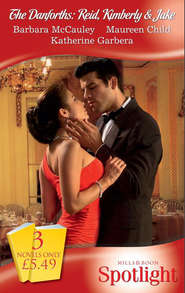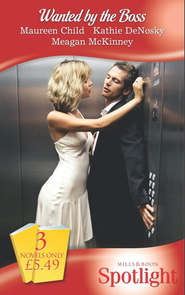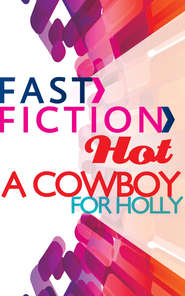По всем вопросам обращайтесь на: info@litportal.ru
(©) 2003-2025.
✖
The Ashtons: Cole, Abigail and Megan: Entangled / A Rare Sensation / Society-Page Seduction
Автор
Год написания книги
2019
Настройки чтения
Размер шрифта
Высота строк
Поля
He opened it and looked over his shoulder. “Are you coming or not?”
“Coats,” she said, delving into the closet. She didn’t have one with her, so she borrowed a raincoat of Merry’s. She tossed Cole his windbreaker.
He shrugged into it impatiently. Then they stepped out into the rain.
Chapter Eight
Somewhere to the west, unseen in the murk, the sun was setting. There was no wind; the rain fell straight and cold. Dixie buttoned her borrowed raincoat and resigned herself to wet hair and ruined shoes. Cole was headed for the vineyards.
They tramped along the strip of barley planted between the vines, not touching. Halfway to the grove of olive trees he spoke abruptly. “I’m sorry. You weren’t flirting.”
“No, I wasn’t. It isn’t me you’re mad at.”
“I don’t know what’s wrong with me.” He stopped, jammed his hands in his pockets and tilted his face up, letting the rain wash it. Then he shook his head like a dog, scattering more drops, and started walking again. “I’ve been flying off the handle all day, and for no good reason.”
“You hate your father, and his existence has been shoved in your face today.”
“He’s old news.”
“He abandoned you.”
“I put all that out of my mind years ago. Lucas has been a father to me, and a good one.”
“The problem with stuffing everything into a compartment labeled ‘the past’ is that the lid can get jarred off.”
He gave a single harsh bark of a laugh. “True. Then the ugly spills out. And there’s a lot of ugly.”
“Whose ugliness are you talking about? Yours? Or your father’s?”
“There’s plenty to go around, but we’ll stick with his for now.” The rain had sleeked all the curl from Cole’s hair, laying it flat against his skull. He tilted his face up slightly and let the rain wash over it. “He stole my mother’s birthright.”
A theft that had made Spencer a rich man. Caroline’s father had been of the old school, unable to believe that a woman could run a major business. He’d left his shares of the Lattimer Corporation to his son-in-law, not his daughter. Less than a year later, Spencer had left Caroline. “I didn’t think you wanted any part of Lattimer Corporation.”
“Not now. Not when it’s been his so long. I don’t want a damned thing that’s his.”
Yet hate was just a deep, hard form of wanting. Cole wanted fiercely for his father to have been a different sort of person, or at least for Spencer to suffer as he’d caused others to suffer.
“It was during the divorce that he really put the screws to her,” Cole went on bitterly.
“What happened then?”
“He grabbed what was left. Money, properties—everything except The Vines.”
“But how? What judge would let him do that?”
“How else? Lies, threats and trickery. He told Mom he’d take us away from her if she fought him. He had people ready to testify that she used drugs.”
“God,” she murmured, rubbing her middle. “He does turn the stomach, doesn’t he?”
He didn’t say anything for several minutes, then burst out, “How does he do it? Are people like clothes to him? If you get tired of a shirt you throw it away. He gets tired of a family and he throws them away. They don’t exist for him after that.”
Dixie thought Spencer Ashton sounded like a classic narcissist. Other people weren’t real for him, except as echoes or reflections of his own ego. “What was he like when you were little?”
“I thought he liked me.” Cole snorted. “I was stupid, obviously, but…sometimes he was great. He used to ruffle my hair when I brought home a good report card and say, ‘Way to go, kid.’ But it was winning he liked, not me.”
“Was he hard to please?”
“More like hard to predict. If things were going badly for him, we all stayed away. He’d take it out on us. But sometimes he’d make a big deal about us. Birthdays, for example. He liked throwing parties. When I turned six he threw this big bash—clowns, balloons, pony rides for the kids, a catered picnic for their parents.”
The faint, wistful tone in his voice tugged at her. She swallowed. “Do you think parties were another way to enhance his own image?”
He shrugged. “They were more about him than me, but I didn’t see that as a kid. He didn’t come to school stuff, either, but back then I thought important people like him were always busy.”
He fell silent. Dixie walked with him, trying not to slide around too much in her slick-soled shoes. Her hair hung in wet rattails down her neck, dripping water beneath the collar of her raincoat. She tugged it to one side.
They reached the little grove of olive trees. It was darker here, but the trees offered some shelter. She stopped. “What about when he left? Kids often blame themselves when their parents break up.”
“I don’t remember blaming myself exactly, but…” He didn’t look at her. “You had it right when you said I hated him. But until he left, I’d tried to be like him.”
“You were a kid. You wanted to please your father, and the only thing that pleases a narcissist is his own reflection.”
“And I made myself into a damn good reflection, didn’t I?”
“No!” She seized his arm, making him turn and look at her. “Where did you get the idea you’re like him?”
“Aside from looking in the mirror, you mean?” Rain ran down the taut lines of his face as if the sky were weeping for him. “Come on, Dixie. You’re not dense. I’ve spent years building Louret up so I could prove to the bastard that we didn’t need him. That I’m better than he is in the one way that means anything to him—making money.”
“You’re ambitious, yes. But you don’t use people. You’d never discard someone the way he has.”
“You left me because I was like him.”
Dixie’s breath caught, hard and painful, in her chest. Was that what he’d thought? All these years had he believed, deep down, that her leaving proved he was like his father?
“Cole.” She reached up with both hands and cupped his hard, wet face between her hands, blinking back tears. “You idiot.”
He searched her face. He couldn’t have seen much in the dimness, but apparently he saw enough. He had no trouble finding her mouth with his.
His kiss was soft and slow and unbearably moving. He drifted his mouth over her cheek. “You’re cold.”
“No kidding.” But it wasn’t cold that made her shiver. It was his fingers playing along her throat.
He wrapped his arms around her and held on tight. “Warmer?” he murmured next to her ear, then kissed it.
She was cold, wet, muddy, and her heart was knocking against the wall of her chest so hard it was a wonder he couldn’t hear it. From fear? Arousal? Sheer exhilaration?
Did it matter? She put her hands on his chest. “Not yet,” she whispered, the words barely audible over the shush-shush of the rain. “Try harder.”
This time his mouth meant business. He kissed, licked and sucked, keeping his arms wrapped tightly around her. Her hands were trapped against his chest. She couldn’t move—could only tip her head back and meet his tongue with hers. His breath was warm. His body was warm and hard, and she ached.
Другие электронные книги автора Maureen Child
Vanished




 0
0











